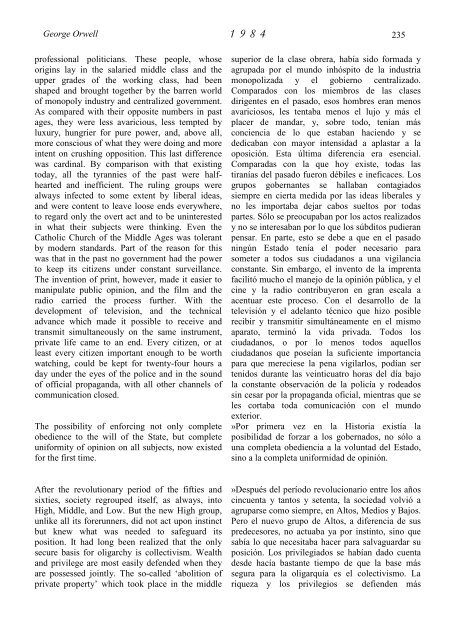You also want an ePaper? Increase the reach of your titles
YUMPU automatically turns print PDFs into web optimized ePapers that Google loves.
George Orwell 1 9 8 4<br />
professional politicians. These people, whose<br />
origins lay in the salaried middle class and the<br />
upper grades of the working class, had been<br />
shaped and brought together by the barren world<br />
of monopoly industry and centralized government.<br />
As compared with their opposite numbers in past<br />
ages, they were less avaricious, less tempted by<br />
luxury, hungrier for pure power, and, above all,<br />
more conscious of what they were doing and more<br />
intent on crushing opposition. This last difference<br />
was cardinal. By comparison with that existing<br />
today, all the tyrannies of the past were halfhearted<br />
and inefficient. The ruling groups were<br />
always infected to some extent by liberal ideas,<br />
and were content to leave loose ends everywhere,<br />
to regard only the overt act and to be uninterested<br />
in what their subjects were thinking. Even the<br />
Catholic Church of the Middle Ages was tolerant<br />
by modern standards. Part of the reason for this<br />
was that in the past no government had the power<br />
to keep its citizens under constant surveillance.<br />
The invention of print, however, made it easier to<br />
manipulate public opinion, and the film and the<br />
radio carried the process further. With the<br />
development of television, and the technical<br />
advance which made it possible to receive and<br />
transmit simultaneously on the same instrument,<br />
private life came to an end. Every citizen, or at<br />
least every citizen important enough to be worth<br />
watching, could be kept for twenty-four hours a<br />
day under the eyes of the police and in the sound<br />
of official propaganda, with all other channels of<br />
communication closed.<br />
The possibility of enforcing not only complete<br />
obedience to the will of the State, but complete<br />
uniformity of opinion on all subjects, now existed<br />
for the first time.<br />
After the revolutionary period of the fifties and<br />
sixties, society regrouped itself, as always, into<br />
High, Middle, and Low. But the new High group,<br />
unlike all its forerunners, did not act upon instinct<br />
but knew what was needed to safeguard its<br />
position. It had long been realized that the only<br />
secure basis for oligarchy is collectivism. Wealth<br />
and privilege are most easily defended when they<br />
are possessed jointly. The so-called ‘abolition of<br />
private property’ which took place in the middle<br />
235<br />
superior de la clase obrera, había sido formada y<br />
agrupada por el mundo inhóspito de la industria<br />
monopolizada y el gobierno centralizado.<br />
Comparados con los miembros de las clases<br />
dirigentes en el pasado, esos hombres eran menos<br />
avariciosos, les tentaba menos el lujo y más el<br />
placer de mandar, y, sobre todo, tenían más<br />
conciencia de lo que estaban haciendo y se<br />
dedicaban con mayor intensidad a aplastar a la<br />
oposición. Esta última diferencia era esencial.<br />
Comparadas con la que hoy existe, todas las<br />
tiranías del pasado fueron débiles e ineficaces. Los<br />
grupos gobernantes se hallaban contagiados<br />
siempre en cierta medida por las ideas liberales y<br />
no les importaba dejar cabos sueltos por todas<br />
partes. Sólo se preocupaban por los actos realizados<br />
y no se interesaban por lo que los súbditos pudieran<br />
pensar. En parte, esto se debe a que en el pasado<br />
ningún Estado tenía el poder necesario para<br />
someter a todos sus ciudadanos a una vigilancia<br />
constante. Sin embargo, el invento de la imprenta<br />
facilitó mucho el manejo de la opinión pública, y el<br />
cine y la radio contribuyeron en gran escala a<br />
acentuar este proceso. Con el desarrollo de la<br />
televisión y el adelanto técnico que hizo posible<br />
recibir y transmitir simultáneamente en el mismo<br />
aparato, terminó la vida privada. Todos los<br />
ciudadanos, o por lo menos todos aquellos<br />
ciudadanos que poseían la suficiente importancia<br />
para que mereciese la pena vigilarlos, podían ser<br />
tenidos durante las veinticuatro horas del día bajo<br />
la constante observación de la policía y rodeados<br />
sin cesar por la propaganda oficial, mientras que se<br />
les cortaba toda comunicación con el mundo<br />
exterior.<br />
»Por primera vez en la Historia existía la<br />
posibilidad de forzar a los gobernados, no sólo a<br />
una completa obediencia a la voluntad del Estado,<br />
sino a la completa uniformidad de opinión.<br />
»Después del período revolucionario entre los años<br />
cincuenta y tantos y setenta, la sociedad volvió a<br />
agruparse como siempre, en Altos, Medios y Bajos.<br />
Pero el nuevo grupo de Altos, a diferencia de sus<br />
predecesores, no actuaba ya por instinto, sino que<br />
sabía lo que necesitaba hacer para salvaguardar su<br />
posición. Los privilegiados se habían dado cuenta<br />
desde hacía bastante tiempo de que la base más<br />
segura para la oligarquía es el colectivismo. La<br />
riqueza y los privilegios se defienden más


